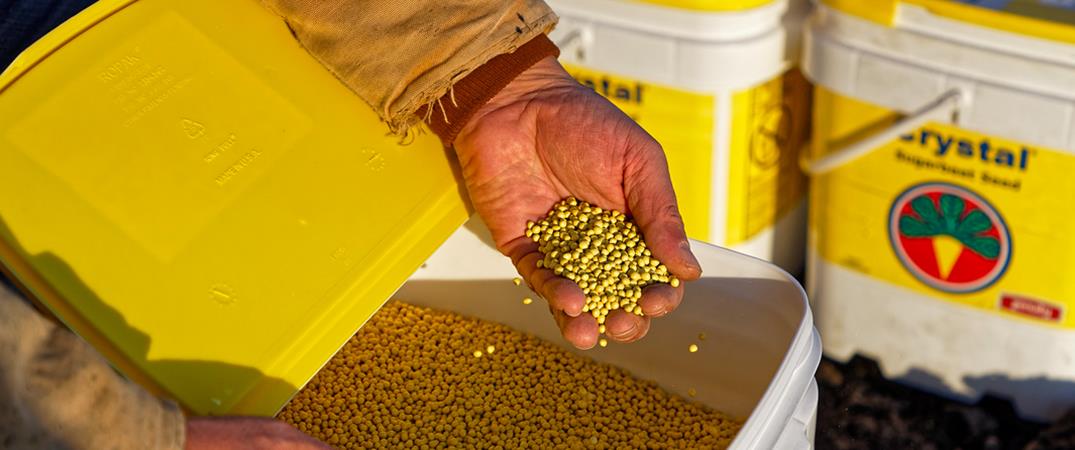
OFFICIAL CODED TRIALS
Where Great Sugar Begins
Bred for Results. Bred for Growth.
The American Crystal Sugar Company trial program is a critical part of our efforts to deliver reliable, quality sugar to the world. Our seed selection process begins with detailed, high-quality data backed with real-world growing experience.
2021 Official Coded Variety Trials
Variety Selector
The Variety Selector is intended to assist growers in selecting appropriate seed varieties by identifying varieties with characteristics that are known to be consistent with the information provided by the grower.
View Official Trial Location Sites
Results
Results from the Official Variety Trial sites were good. Stands in the trials were generally very good this year despite adverse conditions for emergence. Eleven sites were used for variety approval calculations. Two sites were abandoned due to erratic emergence (St. Thomas and Caledonia). Rhizoctonia crown and root rot was minimal in 2021. AZteroid in-furrow, seed treatments, and one application of Quadris were used to control Rhizoctonia. Revenue calculations in 2021 are based on a hypothetical $45.65 payment (5-year rolling average) at 17.5% sugar and 1.5% SLM not considering hauling or production costs.
Fusarium ratings are from one Moorhead site. Rhizoctonia crown and root rot ratings are from two RRV nurseries. Aphanomyces root rot ratings are from the Shakopee nursery. The dry growing season was not conducive for Aphanomyces development, so there are no yield results under Aphanomyces conditions or Aphanomyces ratings from the Red River Valley for 2021. Cercospora leafspot ratings are from Foxhome and Randolph, MN. Root aphid ratings are from a greenhouse assay at Shakopee, MN and a field trial at Longmont, CO. Another set of ratings from a growth chamber assay at Moorhead may be added at a later date.
2021 harvest conditions were excellent. Soil moisture levels remained average to dry throughout the months of August and September creating good harvest conditions in all five Factory Districts.
The 2021 data has been combined with previous years’ data and results are enclosed. Bolter data is presented in plants per acre based on 60,000 seeds per acre. Results for the yield trials from individual sites are available on the internet.
Conventional trials were not planted in the 2021 OVT trials. Conventional varieties that were approved for 2020 and 2021 sales are permitted to continue in 2022 sales.
More detailed information will be available later in the Sugarbeet Research and Extension Reports (www.sbreb.org).
Click here to open a pdf file with the following 2021 Grower Info:
- List of varieties approved for sale to ACSC growers
- Multi-year performance of RR varieties from all sites
- Performance of RR varieties under Aphanomyces conditions
- Performance of conventional varieties from three sites (2017-2019)
- Disease ratings for all nurseries (varieties tested in 2021)
- Root Aphid rating/evaluation
- Trial sites, disease observations and agronomic information from all trial locations
- Seed treatments applied to seed used in the official coded variety trials
Download 2021 Grower Info in Excel Format
Links to 2021 data only follow:
Plot Procedures
Yield trials were planted to stand at 4.5 inches. Plots were planted crosswise (90°) to the cooperators’ normal farming operations, where possible. Plot row lengths for all official trials were maintained at 46 feet with about 39 feet harvested. Planting was performed with a 12-row SRES vacuum planter. The GPS controlled planter gave good single seed spacing which facilitated emergence counting. Seed companies had the option of treating seed with an Aphanomyces seed treatment, insecticide and a Rhizoctonia seed treatment fungicide. Emergence counts were taken on 24 feet of each plot. Multiple seedlings were counted as a single plant if they emerged less than one inch apart. The stands in all yield trials were refined by removing doubles (multiple seedlings less than 1.5 inch apart) by hand but were not further reduced.
Roundup Powermax with Event (surfactant) and full rates of fungicides were applied using a pickup sprayer driven down the alleys. Two applications of Roundup were made in the 4-6 (32 oz) and 8-12 (22 oz) leaf stages. Hand weeding was used where necessary. All yield trials were treated with Quadris in a band during the 6-10 leaf stage (14 oz) for Rhizoctonia control. Treatments used for Cercospora control in 2021 included Inspire XT/Manzate, Agri Tin/Incognito, Proline/Manzate, and Priaxor/Agri Tin. Ground spraying was conducted by ACSC technical staff using 20 GPA and 75-80 psi.
Roundup Ready varieties with commercial seed were planted in four-row plots with six replicates. The RR experimental entries were planted in two-row plots with four replicates.
All plot rows were measured for total length after approximately 3.5 feet at each end were removed at the end of August, with skips greater than 60 inches being measured for adjustment purposes. Harvest was performed with one customized six-row harvester (Big Red, new in 2019) with increased cleaning capacity. All harvested beets of each plot were used for yield determination while one sample (approximately 25 lbs) for sugar and impurity analysis was obtained from each plot. Quality analysis was performed at the ACSC Technical Services quality lab in Moorhead.
Varieties were planted in nurseries in North Dakota, Minnesota, Michigan and Colorado to evaluate varieties for disease and insect susceptibility. ACSC adjusts the Cercospora, Aphanomyces, Rhizoctonia and Fusarium nursery data each year to provide a consistent target for variety approval criteria.
Before purchasing seed, please check to make sure the varieties you are buying are on the current approved list. In accordance with the grower contract, the cooperative has the option to refuse beets of a non-approved variety. If you have questions, please contact the ACSC Technical Services Center or your ACSC Agriculture Department.
